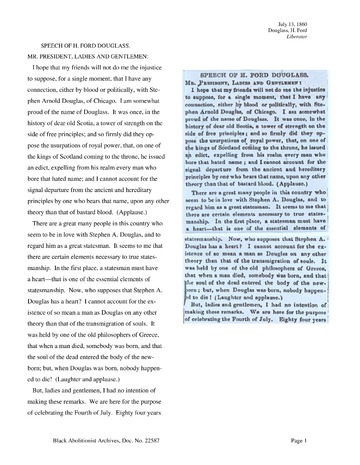
Speaker or author: Douglass, H. Ford
Newspaper or publication: Liberator
Speaking in favor of the Stephen A. Douglas candidacy, the speaker emphasized the pro-slavery position of Abraham Lincoln. He noted that even though the Republican party (to which Lincoln belong) was considered the "anti-slavery party," Lincolns actions showed a different perspective. He noted that Lincoln supported the Fugitive Slave Law and expressed that Lincoln was pro-slavery.
Description of file(s): PDF 23 page, 6,716 word document (text and images)
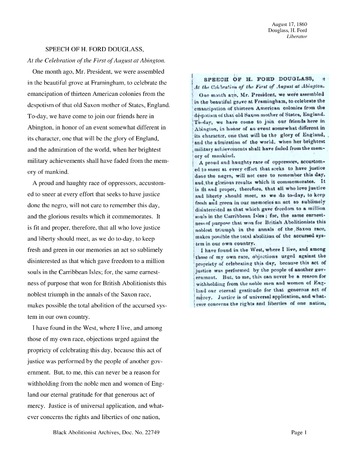
Speaker or author: Douglass, H. Ford
Newspaper or publication: Liberator
Speech expressing the speakers reasons for wanting to continue celebrating August 1st even though opposition had been expressed to this. The speaker said that even though the emancipation of the British West Indies (August 1, 1834) was under the direction of a foreign government, the day was worth celebrating by all those who value freedom. He emphasized the historical efforts and legacies of countries of men who fought, sacrificed and died for freedom.
Description of file(s): PDF 15 page, 4,371 word document (text and images)
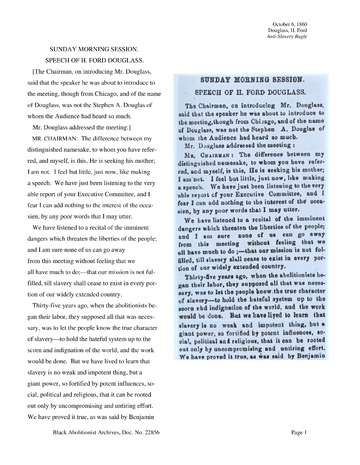
Speaker or author: Douglass, H. Ford
Newspaper or publication: Anti-Slavery Bugle
In this election year, the speaker encouraged continued vigilance in the fight for abolition of slavery. The speaker stressed where each party and each presidential candidate stood on the issue of slavery.
Description of file(s): PDF 12 page, 3,422 word document (text and images)
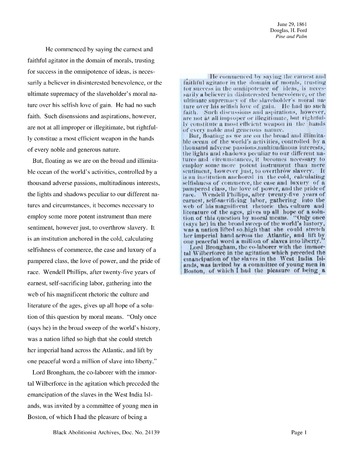
Speaker or author: Douglass, H. Ford
Newspaper or publication: Pine and Palm
The speaker said he believed the first element of success for African Americans was establishing a "nationality." His approach to the abolition of slavery was philosophical. Slavery was not rational in his view and slaveholders, he believed, must come to realize this.
Description of file(s): PDF 5 page, 1,294 word document (text and images)
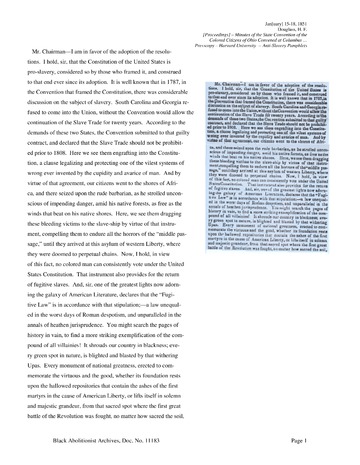
Speaker or author: Douglass, H. Ford
Newspaper or publication: Presscopy -- Harvard University -- Anti-Slavery Pamphlets
Speech given in response to a resolution offered at the convention. The speaker denounced the Fugitive Slave Law and expressed his belief that the "... Constitution of the United States is pro-slavery...."
Description of file(s): PDF 2 page, 773 word document (text and images)
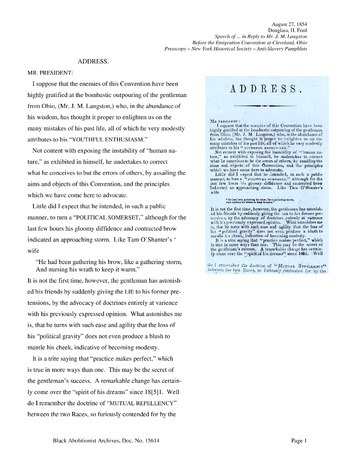
Speaker or author: Douglass, H. Ford
Newspaper or publication: Presscopy -- New York Historical Society -- Anti-Slavery Pamphlets
Speech in reply to John Mercer Langston who the speaker accuses of not being clear regarding his support of colonization. The speaker argues for immigration as a solution to the questions that arise regarding the nominally free people living in the U.S.
Description of file(s): PDF 18 page, 5,605 word document (text and images)
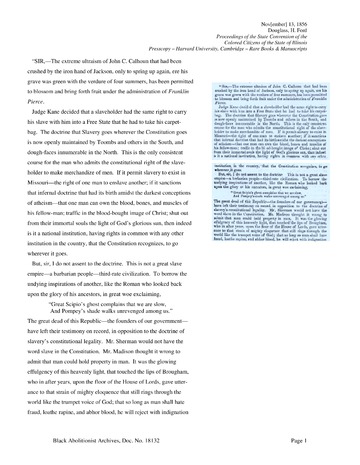
Speaker or author: Douglass, H. Ford
Newspaper or publication: Presscopy -- Harvard University, Cambridge -- Rare Books & Manuscripts
Speech discussing the politics of slavery stressing the influence of government and political figures in continuing the institution.
Description of file(s): PDF 3 page, 1,045 word document (text and images)
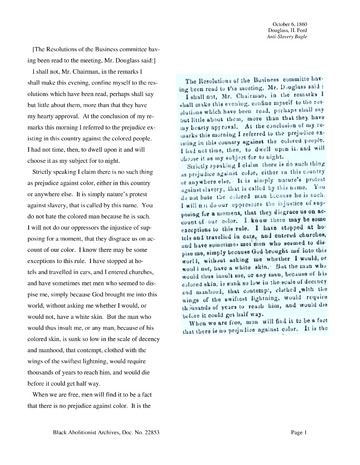
Speaker or author: Douglass, H. Ford
Newspaper or publication: Anti-Slavery Bugle
The speaker offered his thoughts on prejudice, saying, "When we are free, men will find it to be a fact that there is no prejudice against color. It is the condition, not the color. My color serves as a badge, indicating that I belong to a race which in this land has been doomed to degredation. And just so long as we consent to occupy a subordinate condition, and submit without murmuring to our degradation, there is no prejudice against us. So long as the black man is willing to be a slave in this country, all is well enough, but whenever he attempts to take the position of a freeman, it is then the white man seems to hate him." The speaker stressed that prejudice is about slavery, not about skin color.
Description of file(s): PDF 10 page, 2,626 word document (text and images)
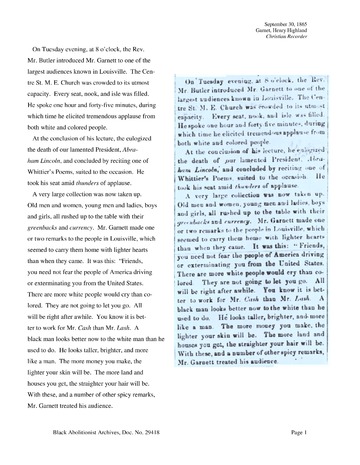
Speaker or author: Garnet, Henry Highland, 1815-1882
Newspaper or publication: Christian Recorder (1852 - 1856)
Brief overview of speech given to eulogize Abraham Lincoln and collect money to benefit the church.
Description of file(s): PDF 1 page, 274 word document (text and image)
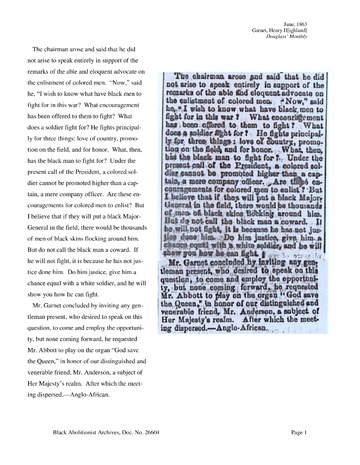
Speaker or author: Garnet, Henry Highland, 1815-1882
Newspaper or publication: Douglass' Monthly
The speaker said that black soldiers were not given the same incentives to fight as white soldiers and this just continued the prejudicial injustice they had already suffered. He asked only that equal rights prevail in the military.
Description of file(s): PDF 1 page, 256 word document (text and image)
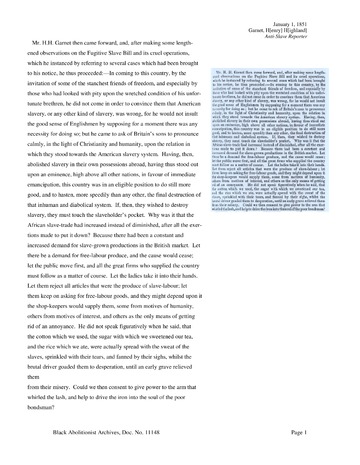
Speaker or author: Garnet, Henry Highland, 1815-1882
Newspaper or publication: Anti-Slavery Reporter
Brief speech denouncing the Fugitive Slave Bill. The speaker also encouraged his audience to buy "free-labor" goods instead of those produced by slave labor.
Description of file(s): PDF 1 page, 436 word document (image and text)
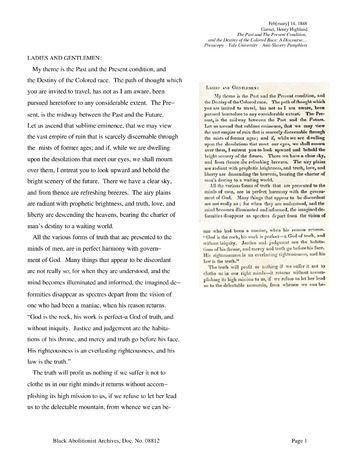
Speaker or author: Garnet, Henry Highland, 1815-1882.
Newspaper or publication: Presscopy -- Yale University -- Anti-Slavery Pamphlets
Speech detailing the history of the Negro race from its great African kings and queens of the past, to its victims of slavery. Included is a look forward to the successes that will come with its future generations.
Description of file(s): PDF 26 page, 7,813 word document (text and images)
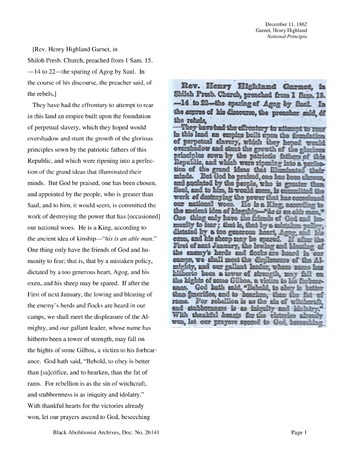
Speaker or author: Garnet, Henry Highland, 1815-1882
Newspaper or publication: National Principia
The speaker included in his sermon a comparison of Biblical text and the current Civil War. He implied that the uprising in the south was againt the will of God.
Description of file(s): PDF 2 page, 369 word document (text and images)
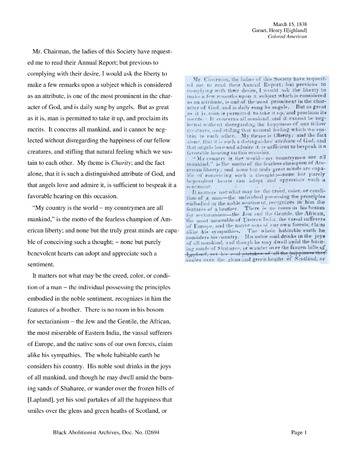
Speaker or author: Garnet, Henry Highland, 1815-1882.
Newspaper or publication: Colored American (1837 - 1842)
Speech praising the assistance, compassion and "charity" women offer in helping to abolish slavery and aiding those in need.
Description of file(s): PDF 5 page, 1,516 word document (text and images)
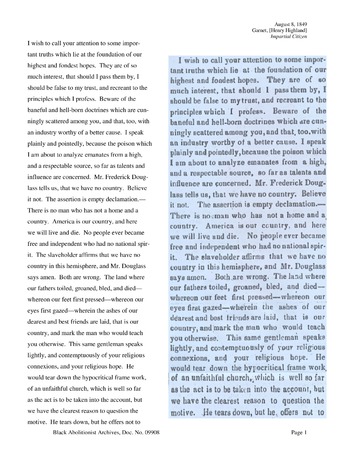
Speaker or author: Garnet, Henry Highland, 1815-1882.
Newspaper or publication: Impartial Citizen
Speech against the beliefs and ideas of Frederick Douglass and Charles Lenox Remond. The speaker expressed his opposition to the political views and ideology of these two men regarding religion, slavery, and love of country.
Description of file(s): PDF 4 page, 1,093 word document (text and images)
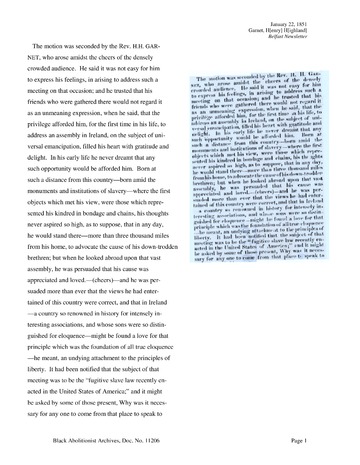
Speaker or author: Garnet, Henry Highland, 1815-1882
Newspaper or publication: Belfast Newsletter
Speech denouncing the Fugitive Slave Law and emphasizing its cruelty and potential to contribute to continued prejudice. The speaker emphasized that the Irish who were immigrating to the U.S. by the hundreds could offer tremendous aid in abolishing slavery.
Description of file(s): PDF 4 page, 1,217 word document (text and images)
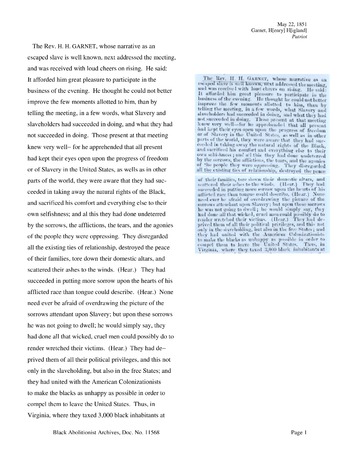
Speaker or author: Garnet, Henry Highland, 1815-1882
Newspaper or publication: Patriot
Speech regarding the damage slaveholding in the U.S. had done not only to humanity, but to the U.S. and everything it stood for. The speaker emphasized that worst among the negative impact slavery has succeeded in having on the U.S. in this respect are the efforts of the American Colonization Society.
Description of file(s): PDF 7 page, 2,038 word document (text and images)
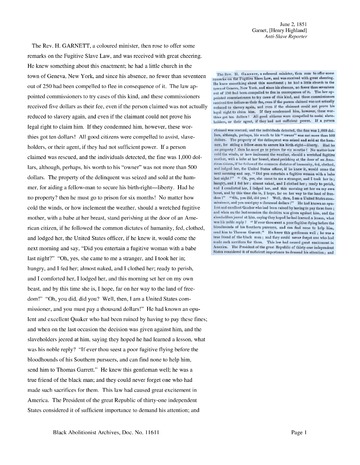
Speaker or author: Garnet, Henry Highland, 1815-1882
Newspaper or publication: Anti-Slavery Reporter
Speech denouncing the Fugitive Slave Law, and focusing on the efforts of the Church in the continuation of the system of slavery.
Description of file(s): PDF 2 page, 882 word document (text and images)
spe.pdf.jpg)
Speaker or author: Garnet, Henry Highland, 1815-1882
Newspaper or publication: Weekly Anglo-African (1859 - 1862)
Speech denouncing the words and political actions of Charles "Pat" O'Conor when speaking against emancipation of U.S. slaves. The speaker said that he would have assumed the Negro race would have had a friend in Charles "Pat" O'Conor since he was from Ireland. However, O'Conor had cautioned the U.S. government that freed slaves would turn against the white population.
Description of file(s): PDF 3 page, 586 word document (text and images)
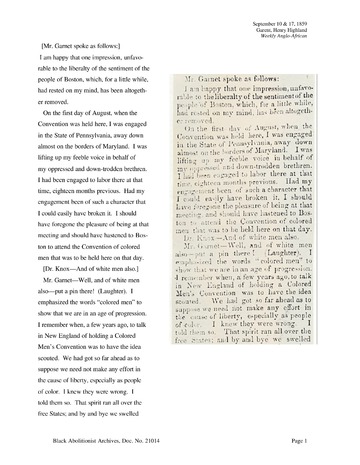
Speaker or author: Garnet, Henry Highland, 1815-1882
Newspaper or publication: Weekly Anglo-African (1859 - 1862)
Lively and debated speech in which the speaker defended his position on the colonization of Africa by free people of color. The speaker was for Colonization, but felt that his position on this effort had been misunderstood. (This speech is continued in speech 21063 and these two speeches are combined here.)
Description of file(s): PDF 26 page, 6,279 word document (text and images)

Speaker or author: Garnet, Henry Highland, 1815-1882.
Newspaper or publication: Presscopy -- Seventh Annual Report of the Executive Committee of the American Anti-Slavery Society, pp. 1-7
Speech given on the seventh anniversary of the American Anti-Slavery Society in response to a resolution put forth stating that all rights and immunities of American citizenship should be afforded to all Americans including the free people of color.
Description of file(s): PDF 7 page, 2,813 word document (text and images)
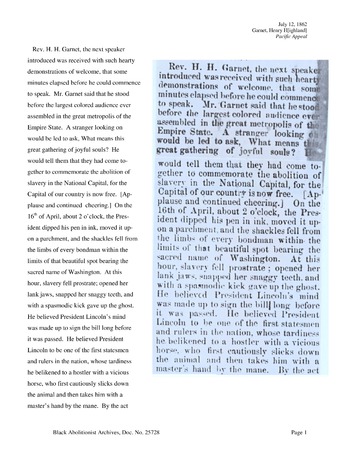
Speaker or author: Garnet, Henry Highland, 1815-1882
Newspaper or publication: Pacific Appeal
Overview of speech given before a large audience in celebration of the end of slavery in Washington, DC. The speaker was hopeful that this was just the beginning of the end of slavery for the entire U.S.
Description of file(s): PDF 2 page, 270 word document (text and images)
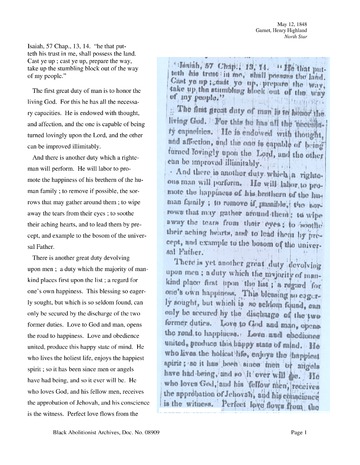
Speaker or author: Garnet, Henry Highland, 1815-1882.
Newspaper or publication: North Star
Sermon regarding brotherly love, honoring God, and trusting in the power of God's love for all men. The speaker offered words of encouragement and hope during troubled times as civil war seemed inevitable.
Description of file(s): PDF 5 page, 1,283 word document (text and images)
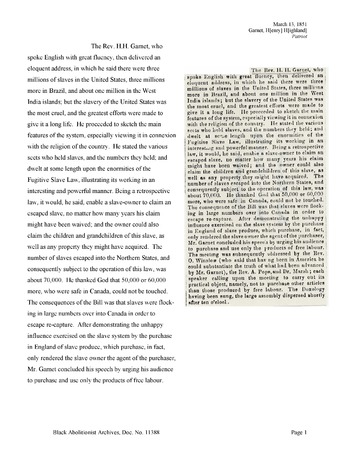
Speaker or author: Garnet, Henry Highland, 1815-1882
Newspaper or publication: Patriot
Brief speech outlining the conditions under which the slaves in the U.S. were living. The speaker emphasized the roles the Church and the continued purchasing of slave-produced products in England were playing in continuing the institution of slavery in the U.S.
Description of file(s): PDF 1 page, 282 word document (text and image)
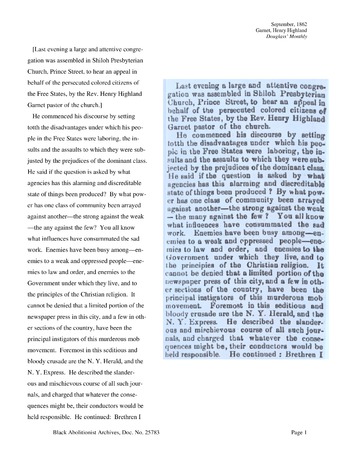
Speaker or author: Garnet, Henry Highland, 1815-1882
Newspaper or publication: Douglass' Monthly
The speaker argued that prejudice and acts of violence against the free people of color in the northern states was instigated by southern extremists in an effort to disrupt the union and encourage unrest. He accused northern newspapers and unjust journalism (fed by southern sympathies) for the current violence against black Americans in the north.
Description of file(s): PDF 4 page, 844 word document (text and images)



